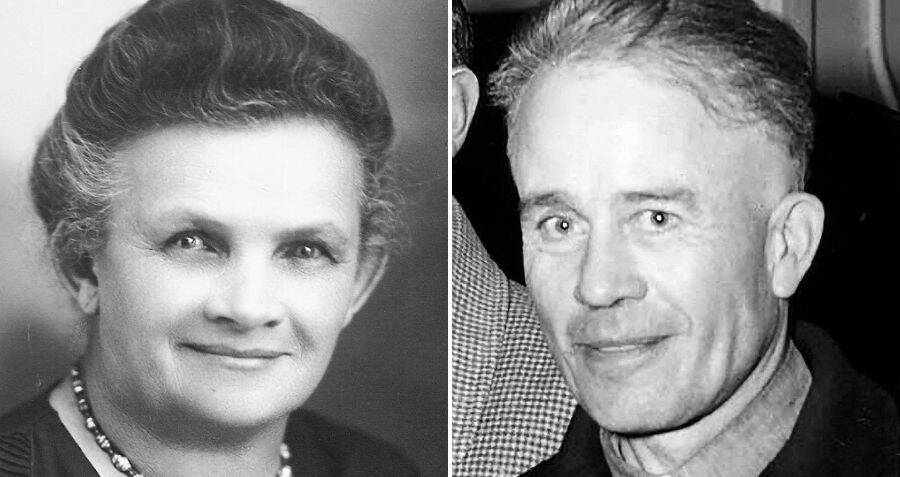Augusta Wilhelmine Gein, a woman whose stern beliefs and authoritative manner significantly impacted the trajectory of her son, Edward Theodore Gein, known infamously as the “Butcher of Plainfield.” Her influence didn’t just shape Ed’s personality but also etched itself deeply into a series of chilling, real-life horror narratives. This article will explore Augusta’s early life, marriage, and her profound imprint on Ed Gein’s infamous path, shedding light on the complexities of their relationship and its far-reaching psychological implications.
Early Life and Background
Born Augusta Wilhelmine Lehrke in 1878, Augusta was part of a large, conservative family of German immigrants in La Crosse, Wisconsin. Raised with seven siblings, her childhood was steeped in the Old Lutheran faith, a more rigid and orthodox variant of mainstream Lutheranism at the time. This religious upbringing framed her worldview, embedding the notion that human nature was inherently sinful. Such beliefs not only governed her life decisions but also profoundly influenced her relationship with her sons, particularly Ed Gein.
Marriage to George Gein
At 22, Augusta married George Philip Gein. Their union was marked by challenges, predominantly stemming from George’s persistent issues with alcoholism and unstable employment. Augusta deeply resented George’s inadequacies but endured the marriage due to her convictions against divorce, a testament to her unwavering religious commitment. She assumed the role of the family’s provider, managing a small grocery store and later acquiring a farm near Plainfield, Wisconsin. This relocation marked a pivotal change, driven by Augusta’s determination to shield her children from the corrupting influences of urban life.
Move to Plainfield
In 1915, seeking respite from the perceived moral corruption of the city, the Gein family transitioned to a more secluded life on a farm outside Plainfield. The farm symbolized a haven for Augusta to exercise greater control over her family, isolating them from society. To her, the farm was not just a home but a fortress against the world’s evils. However, this seclusion had a two-fold impact. While intended to keep sin at bay, it also served as a breeding ground for psychological complications, especially concerning Ed Gein’s development.
Religious Beliefs and Teachings
Augusta’s fervent dedication to the Old Lutheran faith was evident in every aspect of her life. She fervently imparted these beliefs to her sons, emphasizing the sinful nature of humanity. Her sermons painted the world as a place of innate immorality, with a special focus on condemning alcohol and women as embodiments of evil, further alienating her sons from the rest of society. Her teachings gravely impacted their outlook on life, fostering an environment where fear and control were constant companions.
Isolation and Control Over Family
In her pursuit to protect, Augusta resorted to strict measures, isolating her family. The Gein children, forbidden from leaving the farm except for attending school, grew up without much contact with the outside world. This isolation stunted their social skills, with Ed Gein, in particular, struggling to fit in. His attempts to bond with peers were often met with Augusta’s harsh reprimands, reinforcing his insecurities and deepening his dependence on her. Her control over their lives left an indelible mark, influencing the man’s path that culminated in notoriety.
Augusta’s Relationship with Her Sons
Augusta maintained a firm, often overbearing hold on her sons, wielding fear as a tool to keep them in line. Her parenting style was marked by authoritarian control and psychological aggression, often warning Ed and his brother Henry about the perils of women and intimacy. For Ed, this instilled an intense fear and warped conception of sexuality and relationships. Despite her overbearing nature, Ed’s devotion to his mother was unwavering, bordering on obsession. Her influence became the foundation on which his later actions were built, showcasing the complexities of maternal relationships.
Death and Its Aftermath
Augusta’s death in 1945 marked a crucial turning point in Ed Gein’s life. Losing the driving force of control and guidance devastated him. This event precipitated a downward spiral into deeper isolation and mental decline. Alone and overwhelmed by grief, Ed transformed parts of their home into a shrine to Augusta, preserving her memory amidst growing chaos. His actions from this point forward, infamous for their grotesque nature, were driven by a disturbed desire to resurrect his mother or embody her, underscoring the profound psychological damage rooted in their relationship.
Cultural Influence and Legacy
The chilling narrative of Augusta and Ed Gein has had a lasting influence on popular culture, inspiring numerous horror films like “Psycho,” “The Texas Chainsaw Massacre,” and “The Silence of the Lambs.” These films echo the eerie themes present in the Gein household, exploring the depths of psychological manipulation and twisted familial bonds. Augusta’s stern control and distinctive religious beliefs not only shaped Ed’s infamous actions but also captivated the imagination of storytellers, cementing their place in the annals of horror folklore and psychological study.
Conclusion
Reflecting on Augusta Wilhelmine Gein’s life reveals an intricate tapestry of belief, control, and unintended consequences. Her role in shaping Ed Gein’s notorious path underscores the profound impact of parental influence, reminding us of the nuanced dance between nurture and individual destiny. Augusta’s authoritarian grip and unwavering religious conviction left a legacy far beyond her lifetime, haunting the corridors of true crime and fiction alike. For readers curious about similar stories, Startup Biz Mag provides more insights into the intriguing intersections of personality and fate.
This narrative, while unsettling, offers a profound exploration of human psychology, demonstrating how deeply our upbringings can carve pathways into the lives we lead, often with unforeseen outcomes.


